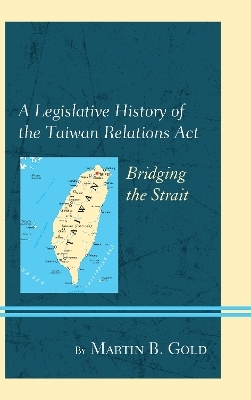
A Legislative History of the Taiwan Relations Act
Lexington Books (Verlag)
978-1-4985-1114-8 (ISBN)
As 1979 dawned, President Jimmy Carter extended diplomatic recognition to the People’s Republic of China. upending longstanding U.S. foreign policy in Asia. For thirty years after the triumph of Mao’s revolution, the United States continued to recognize the claim of the Republic of China, based on Taiwan, to govern the entire country. Intricate economic and cultural relations existed between Washington and Taipei, backed by a Mutual Defense Treaty. While Carter withdrew from the treaty, satisfying a core Chinese condition for diplomatic relations, he presented Congress with legislation to allow other ties with Taiwan to continue unofficially.
Many in Congress took issue with the President. Generally supportive of his policy to normalize relations with China, they worried about Taiwan’s future. Believing Carter’s legislation was incomplete, especially regarding Taiwan’s security, they held extensive hearings and lengthy debates, substantially strengthening the bill. The President ensured the measure comported with the terms of normalization. He negotiated with Congress to produce legislation he could sign and Beijing could at least tolerate. Although the final product enjoyed broad consensus in Congress, fights over amendments were fierce, and not always to the President’s advantage.
Passage of the Taiwan Relations Act stabilized America’s position in Asia and its situation with Taipei, while allowing the new China to be properly launched. Now in its fourth decade, the Act remains highly impactful on the leading bilateral relationship in the world.The United States Constitution makes Congress the President’s partner in shaping American foreign policy. The Taiwan Relations Act of 1979 vividly demonstrates how robust congressional engagement and inter-Branch cooperation leads to stronger and more durable policy outcomes, which enjoy a greater degree of public acceptance.
Martin B. Gold is an attorney and is on the faculty at The Graduate School of Political Management at George Washington University.
Introduction
Chapter 1: The Path to Normalization
Chapter 2: Deng Xiaoping Visits America
Chapter 3: Hearings in the Senate Foreign Relations Committee
Chapter 4: The Senate Foreign Relations Committee Markup
Chapter 5: The Senate Foreign Relations Committee Report
Chapter 6: Hearings in the House Committee on Foreign Affairs
Chapter 7: House Subcommittee on Asian and Pacific Affairs Hearings
Chapter 8: The House Committee on Foreign Affairs Report
Chapter 9: The Administration’s Taiwan/China Legislative Task Force and Senate Confirmation of Ambassador Leonard Woodcock
Chapter 10: The Senate Floor
Chapter 11: The Floor of the House of Representatives
Chapter 12: The Senate and House Resolve Their Differences
Chapter 13: Signing a Bill into Law
Chapter 14: The Perilous Question of Treaty Termination
Appendix 1: Members of the Senate Foreign Relations Committee and the House Committee on Foreign Affairs and their Years of Service
Appendix 2: Chronology
Appendix 3: The Carter Administration’s Legislative Proposal (Introduced by Request)
| Erscheinungsdatum | 10.05.2021 |
|---|---|
| Verlagsort | Lanham, MD |
| Sprache | englisch |
| Maße | 151 x 223 mm |
| Gewicht | 599 g |
| Themenwelt | Geisteswissenschaften ► Geschichte ► Regional- / Ländergeschichte |
| Recht / Steuern ► EU / Internationales Recht | |
| Recht / Steuern ► Öffentliches Recht | |
| Sozialwissenschaften ► Politik / Verwaltung ► Staat / Verwaltung | |
| ISBN-10 | 1-4985-1114-7 / 1498511147 |
| ISBN-13 | 978-1-4985-1114-8 / 9781498511148 |
| Zustand | Neuware |
| Haben Sie eine Frage zum Produkt? |
aus dem Bereich


